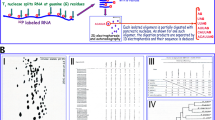Abstract
In this paper I argue that the ontological interpretation of the concepts of reduction and emergence is often misleading in the philosophy of science and should nearly always be eschewed in favor of an epistemological interpretation. As a paradigm case, an example is drawn from the philosophy of chemistry to illustrate the drawbacks of “ontological reduction” and “ontological emergence,” and the virtues of an epistemological interpretation of these concepts.
Similar content being viewed by others
References
Ayala F., Dobzhansky T. (1974). Studies in the philosophy of biology. Berkeley, University of California Press
Hoffmann R. (1995). Fighting reductionism. In The same and not the same (pp. 18–21). New York: Columbia University Press.
Kim J. (1993a). Concepts of supervenience. In: Kim J. (eds), Supervenience and mind: Selected essays. Cambridge, Cambridge University Press, pp. 53–78
Kim J. (1993b). Mechanism, purpose, and explanatory exclusion. In: Kim J. (eds), Supervenience and mind: Selected philosophical essays. Cambridge, Cambridge University Press, pp. 237–264
Kim J. (1993c). The myth of nonreductive materialism. In: Kim J. (eds), Supervenience and mind: Selected philosophical essays. Cambridge, Cambridge University Press, pp. 265–284
Kim J. (2000). Mind in a physical world: An essay on the mind-body problem and mental causation. Cambridge Mass, MIT Press
Kim J. (2005). Physicalism, or something near enough. Princeton, Princeton University Press
Le Poidevin R. (2005). Missing elements and missing premises: A combinatorial argument for the ontological reduction of chemistry. British Journal for the Philosophy of Science 56, 117–134
Lombardi O., Labarca M. (2005). The ontological autonomy of the chemical world. Foundations of Chemistry 7(2): 125–148
Luisi P. (2002). Emergence in chemistry: Chemistry as the embodiment of emergence. Foundations of Chemistry 4(3): 183–200
McIntyre L. (1999). The emergence of the philosophy of chemistry. Foundations of Chemistry 1, 57–63
McIntyre L. (2003). Taking underdetermination seriously. Nordic Journal of Philosophy 4(1): 59–72
Nagel E. (1961). The structure of science: Problems in the logic of scientific explanation. New York, Harcourt, Brace, and World
Sarkar S. (1998). Genetics and reductionism. Cambridge, Cambridge University Press
Shimony A. (1987). The methodology of synthesis: Parts and wholes in low-energy physics. In: Kargon R., Achinstein P. (eds), Kelvin’s baltimore lectures and modern theoretical physics. Cambridge Mass, MIT Press, pp. 399–423
Scerri E., McIntyre L. (1997). The case for the philosophy of chemistry. Synthese 111(3): 213–232
Scerri E. (2000). The failure of reduction and how to resist the disunity of science in chemical education. Science and Education 9, 405–425
Author information
Authors and Affiliations
Corresponding author
Rights and permissions
About this article
Cite this article
McIntyre, L. Emergence and reduction in chemistry: ontological or epistemological concepts?. Synthese 155, 337–343 (2007). https://doi.org/10.1007/s11229-006-9111-3
Received:
Accepted:
Published:
Issue Date:
DOI: https://doi.org/10.1007/s11229-006-9111-3




